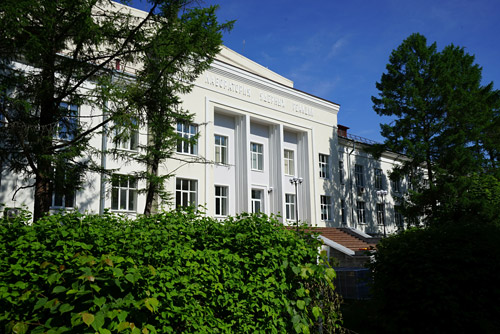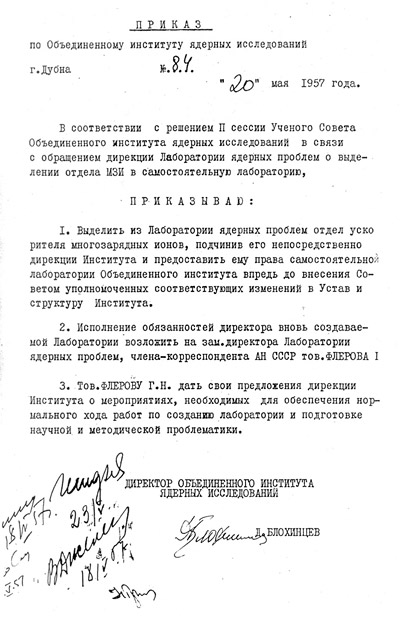
Electronic english version since 2022 |
The newspaper was founded in November 1957
| |
Flerov Laboratory of Nuclear Reactions turns 65
20 May marks the 65th anniversary since the foundation of one of the oldest laboratories of the Joint Institute for Nuclear Research. Over the years, the Flerov Laboratory of Nuclear Reactions has come a long way, its discoveries and achievements have become the pride of the Joint Institute and glorified it for the whole world.

The list of outstanding scientific achievements obtained at the Laboratory is enormous. New types of nuclei decays and new classes of nuclear reactions have been found by FLNR scientists, 10 new chemical elements have been discovered in total, including new superheavy elements with atomic numbers 114-118. The Laboratory has always been and continues to be the leader in the field of heavy-ion physics among world nuclear centres. It is confirmed by the fact that names and symbols of elements of the Mendeleev's Periodic Table immortalise the names of two outstanding researchers of the Laboratory - its founder and first Director Academician G.N.Flerov and the current Scientific Leader of the Laboratory Academician Yu.Ts.Oganessian: elements 114 (flerovium - Fl) and 118 (oganesson - Og). Moreover, the location of the Laboratory and the Institute - Dubna, Moscow region - is marked in the Periodic Table: elements 105 (dubnium - Db) and 115 (moscovium - Mc).
Having pioneered the field of heavy ion physics, FLNR employees have created new scientific realms supported and developed by foreign nuclear centres.
In recent decades, about 50 new isotopes of transactinoid elements have been synthesised in FLNR. The direct experimental evidence of the existence of the island of stability of superheavy elements centred near Z=114 and N=184 has been achieved for the first time.
 An important part of the FLNR research is applied works related to the fields of nanotechnology, materials radiation resistance, and surface modification. The creation of heavy-ion accelerator complexes for the industrial production of unique track membranes is of special importance in the FLNR applied research. Experiments are underway on testing the effects of cosmic rays on electronic components of space devices and biological materials.
An important part of the FLNR research is applied works related to the fields of nanotechnology, materials radiation resistance, and surface modification. The creation of heavy-ion accelerator complexes for the industrial production of unique track membranes is of special importance in the FLNR applied research. Experiments are underway on testing the effects of cosmic rays on electronic components of space devices and biological materials.
The Laboratory pays much attention to training talented youth.
In 2019, the Superheavy Element Factory was commissioned. It is created on the basis of the DC-280 heavy-ion accelerator, a world leader among accelerators of the type. The Factory is designed for the synthesis and study of physical and chemical properties of superheavy elements.
To date, FLNR is the advanced scientific centre, where the unique experimental base has been created and now developed, where the international team of highly qualified scientists and specialists works.
Nowadays, the Laboratory has brilliant prospects for new discoveries that will keep JINR at the cutting edge of world fundamental science.
On 20 May 1957, an order signed by JINR Director D.I.Blokhintsev marked the beginning of the glorious history of FLNR. In honour of this event, the meeting dedicated to the 65th anniversary of the Laboratory of Nuclear Reactions will be held on 26 May. The beginning is at 16.00, the venue is the Conference Hall of the Laboratory of Theoretical Physics. All are kindly invited!